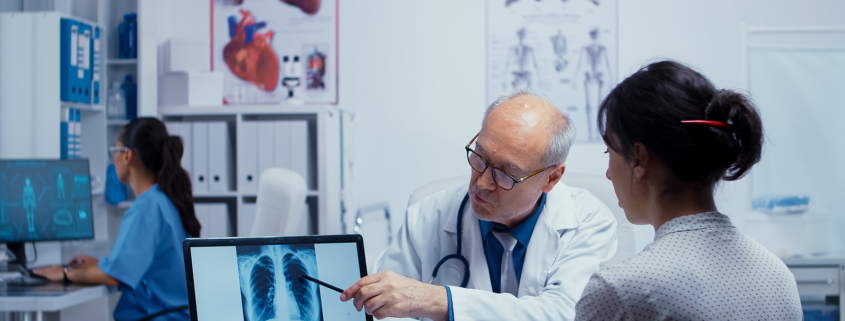What Is The Typical Process For Diagnosing Cancer Cases?
The purpose of providing a complete, all-encompassing treatment is to provide comfort, peace of mind and support through every stage of treatment.
This is not limited to the stages that take place at our specialist radiotherapy centre, but also includes advice and support when it comes to fitness, physical health and nutrition during treatment, aftercare, and support during the diagnosis process.
An early diagnosis is very important, as it allows for a wider range of treatment options and gives oncologists a wider range of advanced non-intrusive treatments at their disposal.
Getting diagnosed with cancer can differ from person to person, and as many people know first-hand or know from other people, everyone’s story can be unique. This can make it difficult at times to know what to expect if you or your doctor suspects you have cancer.
In the interest of providing insight and reassurance, here are some common stages for diagnosing cancer and what kind of expectations you should have.
How Is Cancer Initially Diagnosed?
The first step to diagnosis is also quite possibly the most variable, as some people will have a cancerous tumour but no symptoms, or may have somewhat nonspecific symptoms that they may not associate with cancer, but could be an early warning sign.
The three most common ways people are diagnosed with cancer are either through screening programmes, during tests for otherwise unrelated conditions or by booking an appointment with a doctor.
Screening Campaigns
Screening campaigns can vary considerably by country, but they will often involve either a home kit or a minimally invasive procedure to provide a sample that can be tested for a number of common types of cancer.
These typically include tests for breast, cervical and bowel (colorectal) cancers, but there may also be screening programmes available now or in the near future for stomach, lung and prostate cancer.
Unrelated Tests
There are several tests that are used to diagnose cancer that are also used in the screening of other conditions, so what can sometimes happen is that a doctor who checks someone who has an MRI or CT scan for an unrelated issue, such as a dental abscess or a broken bone, may also find an unusual result.
After informing the person about what they have found, that could lead to further tests to confirm or deny that the aberration was a sign of cancer.
Potentially Cancer-Related Symptoms
Typically, the first part of a cancer diagnosis is predicated on experiencing symptoms that do not feel right or do not seem to have a clear and obvious cause.
These more general symptoms of cancer could potentially be caused by a lot of different reasons, including other diseases, existing conditions or even stress.
Regardless, if you are concerned about any unusual feelings you have, book an appointment with your doctor to clear up any concerns. Even if it is not cancer, it may be another treatable condition that could be cleared up and improve your quality of life.
Here are some common symptoms that could potentially be cancer-related:
- Fever or significant sweating at night. Sometimes both of these are the result of infections, side effects of medications or the menopause. However, if there is no other explanation, talk to your doctor about it.
- Severe fatigue, especially if there is no clear reason for why you may feel tired (such as issues with sleeping, insomnia or stress).
- Unexpected bruising or bleeding, particularly if blood is found in bodily fluids such as vomit or saliva after coughing.
- Persistent or unexplained aches and pains beyond those that might be expected with ageing or pain-related conditions.
- Noticeable weight loss without any other explanation.
- Persistent lumps or swelling anywhere in the body.
How Is Cancer Confirmed?
Once a doctor suspects a cancer diagnosis, the next step is to book a series of relevant tests that will help to either confirm the diagnosis or explain why you may be experiencing similar symptoms.
These tests will vary based on the type of cancer you have, but will include scans, X-rays, blood tests to check for certain cancer markers, or a biopsy.
A biopsy is where a doctor will extract a sample of tissue and examine it using a microscope in order to check for cancer cells. In some cases, this is the only way to confirm cancer, but because it is a minimally invasive procedure, it will only be done if there is no other way to check.
You will be given advice and an explanation of each test, anything you need to do to prepare for it and what the cancer team is looking for.
A confirmation will also provide greater insight about the type of cancer, its staging and what types of treatments are available to be incorporated into a treatment plan.
Can You Get A Second Opinion?
Particularly when it comes to cancer, doctors and specialist oncologists understand the vital importance of a second opinion, and as long as there is time to get one before treatment must start, you may be encouraged and supported in seeking one out.
As a specialist cancer care centre, we are often involved in additional support for second opinions as part of a patient-centred philosophy.


